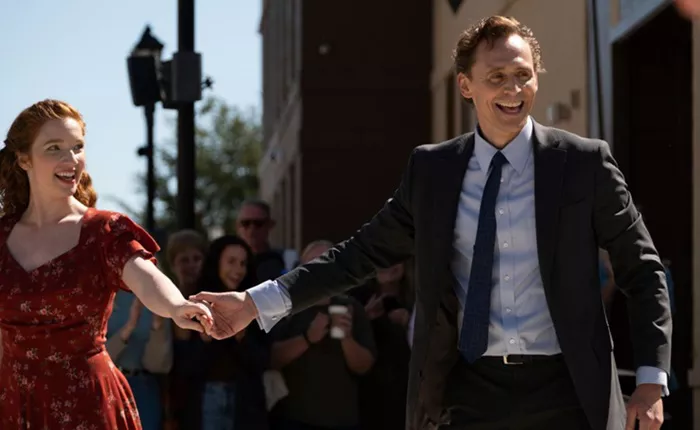Acclaimed horror director Mike Flanagan steps away from the macabre to deliver a surprisingly gentle and introspective adaptation of Stephen King’s short story The Life of Chuck. The film, based on a novella from King’s 2020 collection If It Bleeds, blends existential reflection with surreal imagery, offering a deeply human narrative anchored by strong performances and a visually rich presentation.
Flanagan—known for modern horror classics such as Oculus, Midnight Mass, and King adaptations like Gerald’s Game and Doctor Sleep—takes on one of King’s more enigmatic and emotionally layered works. The result is a thought-provoking film that avoids traditional horror tropes in favor of a more meditative tone.
A Narrative Told in Reverse
The Life of Chuck is structured in three distinct acts, told in reverse chronological order. It opens with “Act III – Thanks, Chuck,” in which the world is experiencing apocalyptic collapse—California sinks into the ocean following a 9.1-magnitude earthquake, and society begins to unravel. Amid the chaos, cryptic billboards and advertisements begin to appear, thanking a mysterious man named Charles “Chuck” Krantz for “a beautiful 39 years.”
Chiwetel Ejiofor stars as Marty, a high school teacher attempting to maintain some semblance of normalcy. As the world darkens, he reconnects with his ex-wife, Felicia (Karen Gillan), a nurse pushed to her emotional limits. The segment ends with the first appearance of Chuck himself (played by Tom Hiddleston), a haunting presence that subtly ties the narrative threads together.
Dance and Memory
The second act, “Act II – Always a Dancer,” shifts tone dramatically. Here, a middle-aged Chuck, portrayed as a mild-mannered accountant, impulsively joins a street performer in an exuberant dance routine in a public square. This whimsical yet poignant moment—set against a mundane work trip—symbolizes Chuck’s brief but meaningful reawakening. Anneliese Basso co-stars as Janice, a stranger drawn into the dance, forming an ephemeral yet impactful connection.
The Origins of Chuck
In “Act I – I Contain Multitudes,” the film delves into Chuck’s childhood. Young Chuck (played by Jacob Tremblay) lives with his grandparents, Albie (Mark Hamill) and Sarah (Mia Sara), in a house marked by love and quiet tragedy. We learn of past family losses, Chuck’s early passions, and the origins of his fascination with numbers—instilled by his grandfather, who believes mathematics underpins the universe.
Though these three acts differ in tone and narrative style, they converge thematically around memory, mortality, and the impact one life can have. The surreal elements—particularly the collapsing world and supernatural undertones—are more subtle than fully explained, occasionally creating tonal dissonance but never overwhelming the emotional core.
Standout Performances and Direction
Tom Hiddleston delivers a nuanced performance as Chuck, portraying him with quiet dignity and emotional restraint. His central dance scene stands out as a rare, cathartic moment of expression, underscoring the film’s message about seizing fleeting joy. Strong supporting performances by Ejiofor, Gillan, and Tremblay elevate the emotional stakes, while Hamill’s portrayal of the philosophical grandfather provides some of the film’s most reflective moments.
Visually, the film benefits from cinematographer Eben Bolter’s painterly compositions, enhancing both the everyday and the extraordinary elements of the story. Flanagan’s direction is assured, though occasional overuse of narration and some jarring transitions between realism and the supernatural slightly undermine the film’s cohesion.
A Humanist Vision of King’s Work
The Life of Chuck joins the ranks of other emotionally resonant Stephen King adaptations like The Shawshank Redemption and Stand by Me. Like directors Rob Reiner and Frank Darabont before him, Flanagan taps into King’s underlying humanism—his empathy for flawed, searching individuals navigating profound moments in their lives.
The film may not reach the iconic heights of those earlier adaptations, but it offers a quiet, reflective story that speaks to the preciousness of time and the beauty found in ordinary lives. At its heart, The Life of Chuck is a meditation on impermanence, memory, and the interconnectedness of seemingly small moments.
In a world that often feels on the brink, the film delivers a gentle but powerful reminder: every life, no matter how brief or quiet, leaves an indelible mark.
Related Topics
- Ana de Armas Steals Spotlight in ‘Ballerina’
- Fans Applaud “Golmaal 5” on Release Day
- “Predator: Skull Hunters” Fails to Match Prey’s Success

